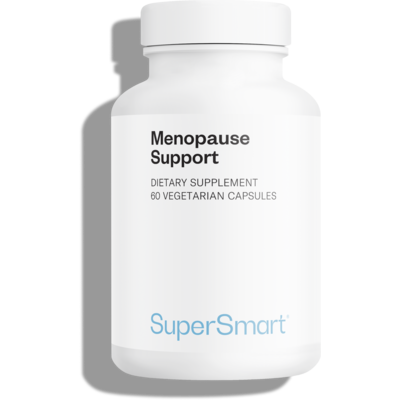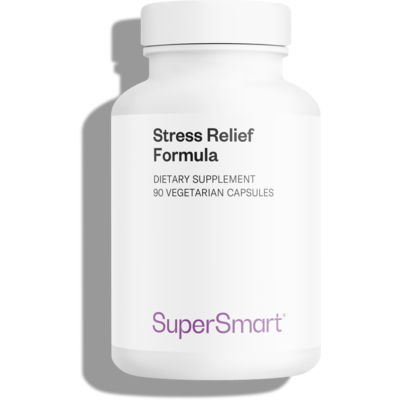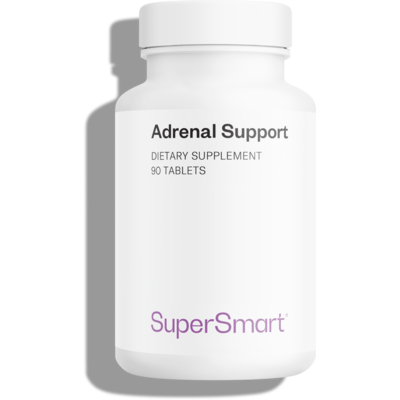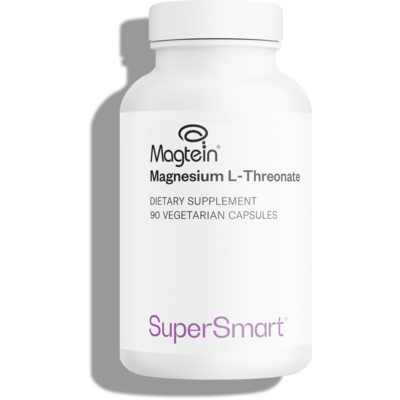A study reveals a link between high cortisol levels and neurodegenerative disorders
A recent study highlights a link between high levels of cortisol and cognitive decline. This suggests that better management of this hormone could be crucial for preserving brain health...

Cortisol: a double-edged stress hormone
Cortisol is a steroid hormone produced by the adrenal glands, two endocrine glands located above the kidneys.
This hormone plays a key role in regulating many of the body's functions: energy metabolism, immune response, blood pressure, etc.
Cortisol is also one of the stress hormones (along with adrenaline). It helps the body react to a specific danger or difficult situation by releasing glucose stored in the liver to increase the energy available.
But when stress becomes chronic, cortisol can be secreted in excess over long periods. This can then quickly have a negative impact on the brain and overall health.
Excess cortisol can be caused by a number of factors:
- repeated emotional stress (work overload, chronic anxiety...) (1)
- lack of sleep (2)
- hormonal imbalances (peri-menopause, menopause) (3)
- lifestyle factors (poor eating habits, a sedentary lifestyle and being overweight) (4)
Cortisol levels and cognitive decline: what the study reveals
A new study published in 2024 (5) followed a large sample of post-menopausal (and cognitively healthy) women for 15 years to explore the impact of cortisol levels on brain health.
The result: high blood levels of cortisol in midlife are associated with increased accumulation of amyloid plaques (one of the biological markers of Alzheimer's disease) in post-menopausal women.
Several mechanisms could explain the link between high cortisol levels and neurodegenerative disorders:
- Excess cortisol is thought to promote neuroinflammation, which progressively deteriorates neuronal networks (6).
- It could reduce neuronal plasticity, which is essential for learning and memory (7).
- It could disrupt the regulation of sex hormones (such as oestrogen), known for their protective role on the brain (8).
Although these observations mainly concern post-menopausal women, they underline the importance for everyone of monitoring their stress levels in order to preserve their cognitive functions as they age.
Managing cortisol: what natural solutions are there to support the nervous system?
To manage cortisol levels, we recommend adopting a healthy lifestyle daily. Certain natural active ingredients can also provide invaluable support to promote relaxation and limit the impact of stress on the nervous system.
Simple but powerful lifestyle habits
To reduce excessive cortisol levels, you can focus on:
- good quality sleep: a good night's sleep allows the body to regenerate and regain its hormonal balance;
- moderate physical activity, such as walking or yoga: this helps to release endorphins, which naturally calm the nervous system;
- anti-stress techniques such as deep breathing, yoga, meditation or guided relaxation exercises: these help to calm the mind and regulate cortisol production.
Incorporated into daily life, these practices help you to manage stress and tension more effectively.
Adaptogenic plant extracts
Several adaptogenic plants may help to increase the body's resistance to stress and promote better emotional balance.
Ashwagandha, for example, supports periods of mental stress, contributes to optimal relaxation, emotional balance and overall mental and physical well-being.
Passiflora flower extract (Passiflora incarnata) acts on the nervous system and promotes sleep.
Schisandra berry extract (Schisandra chinensis) can increase the ability to adapt to stress and improve stress resistance.
![]() Discover Stress Relief Formula, a synergy of soothing plants and nutrients to help you cope with periods of nervous tension. This supplement contains passion flower extract, schisandra berry extract and magnesium.
Discover Stress Relief Formula, a synergy of soothing plants and nutrients to help you cope with periods of nervous tension. This supplement contains passion flower extract, schisandra berry extract and magnesium.
Magnesium: an ally of the nervous system
An ally of the brain and cognitive health, magnesium contributes to normal psychological functions and the normal functioning of the nervous system.
A patented form, magnesium L-threonate is able to cross the blood-brain barrier for unbeatable bioavailability.
![]() Discover Magnesium L-Threonate, a latest-generation magnesium dietary supplement, the only form of magnesium capable of increasing magnesium levels in the brain.
Discover Magnesium L-Threonate, a latest-generation magnesium dietary supplement, the only form of magnesium capable of increasing magnesium levels in the brain.
Vitamins and nutrients to support the adrenal glands
The adrenal glands are directly involved in the production of cortisol.
Containing minerals, vitamins and adaptogenic plant extracts, certain food supplements can help to support the balance of the adrenal glands and promote a better response to stress.
![]() Discover Adrenal Support, a formula designed to help the body cope with chronic stress. It contains eleutherococcus and rhodiola (two adaptogens that help cognitive performance), as well as vitamin C, which helps reduce fatigue.
Discover Adrenal Support, a formula designed to help the body cope with chronic stress. It contains eleutherococcus and rhodiola (two adaptogens that help cognitive performance), as well as vitamin C, which helps reduce fatigue.
Patented supplements that promote calm and serenity
Several plants have been used for thousands of years to restore emotional well-being. They have been used to develop targeted food supplements for stress and mood.
Relora® is a patented complex of specific extracts of Phellodendron amurense and Magnolia officinalis, two plants used in Chinese herbalism to soothe stress and reduce muscular tension.
![]() Discover Relora® 250 mg, a patented extract of magnolia bark and phellodendron, developed to calm the mind and limit the effects of stress (without sedative effect).
Discover Relora® 250 mg, a patented extract of magnolia bark and phellodendron, developed to calm the mind and limit the effects of stress (without sedative effect).
A specific menopause supplement
The menopause is a period of intense hormonal upheaval, often accompanied by increased levels of stress and cortisol.
Food supplements are perfectly suited to this period, bringing together the best natural compounds to alleviate and cope better with the symptoms of the menopause.
![]() Discover Menopause Support, a complex that provides gentle support during this transitional period, with no added synthetic hormones.
Discover Menopause Support, a complex that provides gentle support during this transitional period, with no added synthetic hormones.
SUPERSMART ADVICE
References
- Pulopulos MM, Baeken C, De Raedt R. Cortisol response to stress: The role of expectancy and anticipatory stress regulation. Horm Behav. 2020 Jan;117:104587. doi: 10.1016/j.yhbeh.2019.104587. Epub 2019 Oct 25. PMID: 31639385.
- Chen Y, Xu W, Chen Y, Gong J, Wu Y, Chen S, He Y, Yu H, Xie L. The effect of acute sleep deprivation on cortisol level: a systematic review and meta-analysis. Endocr J. 2024 Aug 8;71(8):753-765. doi: 10.1507/endocrj.EJ23-0714. Epub 2024 May 21. PMID: 38777757.
- Kapoor E. Menopause symptoms and the cortisol response. Menopause. 2021 Nov 29;29(1):6-7. doi: 10.1097/GME.0000000000001907. PMID: 34964722.
- Salehi M, Ferenczi A, Zumoff B. Obesity and cortisol status. Horm Metab Res. 2005 Apr;37(4):193-7. doi: 10.1055/s-2005-861374. PMID: 15952076.
- Salardini A, Himali JJ, Abdullah MS, Chaudhari R, Young V, Zilli EM, McGrath ER, Gonzales MM, Thibault EG, Salinas J, Aparicio HJ, Himali D, Ghosh S, Buckley RF, Satizabal CL, Johnson KA, DeCarli C, Fakhri GE, Vasan RS, Beiser AS, Seshadri S. Elevated serum cortisol associated with early-detected increase of brain amyloid deposition in Alzheimer's disease imaging biomarkers among menopausal women: The Framingham Heart Study. Alzheimers Dement. 2025 Apr;21(4):e70179. doi: 10.1002/alz.70179. PMID: 40271551; PMCID: PMC12019305.
- Holleman J, Daniilidou M, Kåreholt I, Aspö M, Hagman G, Udeh-Momoh CT, Spulber G, Kivipelto M, Solomon A, Matton A, Sindi S. Diurnal cortisol, neuroinflammation, and neuroimaging visual rating scales in memory clinic patients. Brain Behav Immun. 2024 May;118:499-509. doi: 10.1016/j.bbi.2024.03.024. Epub 2024 Mar 17. PMID: 38503394.
- van Ast VA, Cornelisse S, Marin MF, Ackermann S, Garfinkel SN, Abercrombie HC. Modulatory mechanisms of cortisol effects on emotional learning and memory: novel perspectives. Psychoneuroendocrinology. 2013 Sep;38(9):1874-82. doi: 10.1016/j.psyneuen.2013.06.012. Epub 2013 Jul 8. PMID: 23845515; PMCID: PMC3934796.
- Rao ML, Kölsch H. Effects of estrogen on brain development and neuroprotection--implications for negative symptoms in schizophrenia. Psychoneuroendocrinology. 2003 Apr;28 Suppl 2:83-96. doi: 10.1016/s0306-4530(02)00126-9. PMID: 12650683.
Keywords
7 Hours
Order was shipped on time and packaged…Wonderful Jobs!
Order was shipped on time and packaged excellently.
DMHoge
6 Days
great products and prices
great products and prices
Marie
12 Days
Easy to navigate site
Easy to navigate site, had what I was searching for, good price. easy order-check out
James Tucker
18 Days
My skin is clearing up nicely!
Pretty good for my skin so far.
Christian
20 Days
The new packaging is excellent
The new packaging is excellent - finally! No more squashed boxes and torn envelopes.
GORAN
21 Days
Great Product
Great Product
Larry Garrett
25 Days
Quick shipping
Quick shipping; good price. No issues!
Mary McCarty
27 Days
Thr product is very good and is helping…
Thr product is very good and is helping me on my health. Then is always on time
LUGO Luz
29 Days
Buying was fine
Buying was fine. I had problems with the website not recognizing my login info, and had to call to get it fixed. Other than that, everything was good.
David S. Clark
30 Days
Your super maca and super ginseng are…phenomenal
Your super maca and super ginseng are phenomenal supplements that compliment each other when taking them together. Fantastic feeling of well-being and lots of mid day energy without the crash.
Keith Mason
32 Days
I have had amazing results with every…
I have had amazing results with every supplement I've purchased. I am extremely satisfied with this company
kirstin Torres
32 Days
Fine products
Fine products . They are on the leading edge of online supplements. The only issue -so far-is they sometime run out of subscription items.
Jason Argos
35 Days
The ordering process is very user…
The ordering process is very user friendly and the products always come in a timely manner.
CARTER Rhonda
36 Days
The price for Dr
The price for Dr. Pero's AC-11 is reasonable and in line with his views. (my former colleague). Keep it pure.
CAMPBELL Clayton
39 Days
Right on every time.
Right on every time.
Arthur Nicholas








